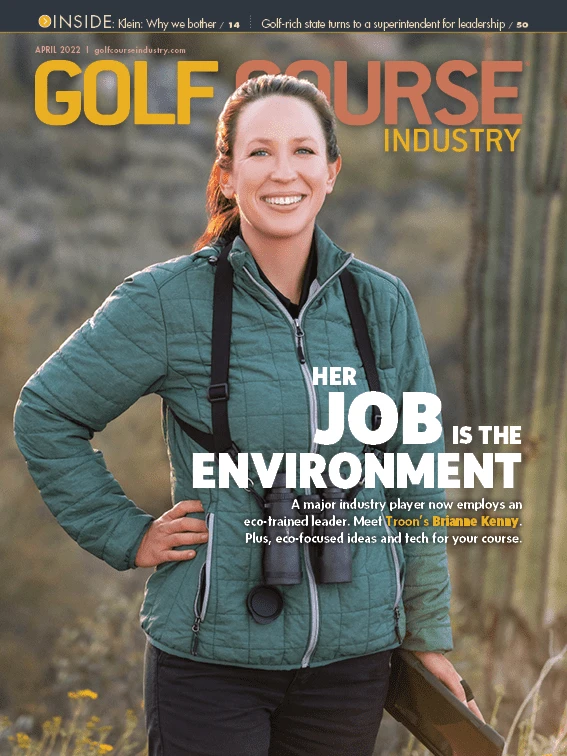
There’s a scene in the movie How the Grinch Stole Christmas (based on Dr. Seuss’s beloved children’s tale), where the Grinch can’t decide whether to accept a social invitation. The Grinch is literally and undeniably green — he’s an ace at recycling, warns against materialism and prefers renewable energy. He debates with himself, muttering, before he decides not to go and then later, he does go. Green decisions can similarly involve uncomfortable debates and reversals.
It feels like the answers should be straightforward and easy. Just go for it! It’s the right thing to do! The realities of budgets, profitability, unpredictable natural outcomes and disparities of passion and intellect complicate these decisions. Setbacks are part of environmental efforts but there are also environmental triumphs and those wins provide a framework and encouragement for environmental goal-setting and accomplishments. The certainty that properly managed properties provide a confluence of social, economic and environmental progress is where corporate sustainability in golf excels.
Founded in 1990, Troon is a behemoth in the golf world. It operates in 30 countries and manages more than 620 properties. Those management contracts range from handling everything to managing a single aspect of the property, such as the agronomy team. Across those locations, Troon manages more than 24,000 staff members. Troon continues to grow through mergers and acquisitions, such as with OB Sports and Indigo Golf Partners, but also property by property. In 2021, TPG Capital and Symphony Ventures, the investment fund of Rory McIlroy, committed to a significant strategic investment in Troon.
Comprehending this growth is important for perspective but won’t matter on a daily basis to those employees who are working to provide great conditions and hospitality for the guests frequenting Troon properties. In 2019, Troon created a position that is making a day-to-day difference for the agronomists and maintenance staff. The brainchild of Jeff Spangler, DaveNicholls and Brian Hampson, leaders on the science and agronomy team, they decided to offer Brianne Kenny the opportunity to be Troon’s first manager of environmental science.

Immediate value
Kenny graduated from Ohio State University with a bachelor of science in forestry, fisheries and wildlife science. She earned her master of arts in biology from Miami University with a focus on ecological economics. That program was essentially a blend of online learning and international field studies taking Kenny to Guyana, Thailand and Mexico. While she was studying for her master’s, Kenny picked up waitressing at Troon Country Club in Scottsdale, Arizona. She recalls being attracted by the Troon scholarship noted on the application, which she would earn.
Kenny was unfamiliar with golf until being employed by Troon. “I remember the orientation tour and I was like, ‘This is what a golf course looks like?’ Desert-style it’s pretty low acreage with a lot of desert habitat. Sparks just started flying in my head from there,” Kenny says. She started asking questions, conversing with the superintendent and the horticulturist and soon was working on the maintenance team. She helped out with the Audubon certification and started working at some other Troon properties in different seasons, in Wyoming and Oregon, and at a few more courses in Arizona before settling into her new position.
Kenny reports to Nicholls and has three primary responsibilities: encouraging and supporting Troon properties as they meet and maintain governmental compliance, liaising with government bodies in support of the industry, and working with courses to achieve environmental certifications.
“The way I describe it, I tell people to picture a tree, any tree that you want. I say the roots of the tree are like the federal, state and county regulations set by the EPA or state agencies,” Kenny says. “Those are providing the foundation for what everyone should focus on. Troon’s environmental and agronomic standards are the trunk providing more structure and building off of the roots. Certifications and outreach are the flowers and the fruit of the tree, where there is some attention and we can help build the industry more, almost like being pollinated. I really want everyone to focus on those federal and Troon standards first, because once you get those you are establishing a very healthy base and those flowers and fruit are going to come naturally.”

Jonathan Williams, director of agronomy, has been at various Troon properties since 2007 and has witnessed the company’s environmental efforts over the past 15 years. They have pushed for Audubon International and EPar certifications, worked through Hazard Communications standards and are continuously finding ways to improve.
“Our company is diverse in the properties we manage and we have an obligation to ensure that we are not incurring liabilities,” Williams says. “That’s what drove everything prior to Bri coming on board. Environmentally and regulation-wise, that’s how the company evolved. With the superintendents that we employ, we try to make sure that everyone sees visions and goals but sometimes it’s difficult to get everyone on board. Just like any business or classroom, 96 percent of the students did their homework, but 4 percent didn’t.” Kenny can help with that, not only with her position, expertise and communications skills, but because “she’s wonderful as a teammate and awesome to work with,” Williams adds.
Kenny’s position enables her to understand nuances and regulations in different parts of the country, to go beyond state and local to include Native American reservations and also liaise with the international team at Troon. The relationships she is forming by working with government bodies and organizations is helpful for Troon and has wide-ranging implications for properly developed, comprehensive legislation.
Kenny has worked with Williams and engaged in conversations with the Arizona Department of Water Resources regarding legislation for water management. She also was contacted by the North Carolina Natural Heritage Program for help with a Venus flytrap study because there were several at a Troon course in North Carolina. Working together broadens what can be accomplished.
Troon is now managing The National Links Trust courses, which are owned by the National Park Service. Architects Tom Doak, Gil Hanse and Beau Welling are donating design services to help restore these three courses, and Mike Keiser is also backing the project. Troon’s size means its footprint and influence on responsible environmental management can grow through relationships with government entities.
Growing purposefully

“I think as a company when you take an initiative and make it a priority, such as environmentalism, and when we try to promote it at every facility, having a person you can dedicate to that shows the ownership, our clients and the industry that we are taking it seriously,” says director of science and agronomy Jeff Cathey, who covers the growing Florida region for Troon, as well as Central America and the Caribbean. “It’s not just something we tack on. Kenny enables us to address this with more sincerity and demonstrate how committed we are to this.”
Cathey has been with Troon since 1999, preferring corporate stability and the possibility of helping the company grow in addition to growing with the company. Troon often promotes from within. “Their agronomic and environmental practices, even then, were very important,” Cathey says. “It clicked. It registered. I could see what they were doing and I appreciated the direction they were going. It was a no-brainer and I have spent 23 years with this great company.”
Troon is helping with environmental projects that are beyond golf course maintenance. Kenny and Cathey recently worked with the team at BallenIsles Country Club in Palm Beach Gardens, Florida, regarding some problems with a colony of wood storks. Wood storks are an indicator species for the Everglades ecosystem and this colony has been on a small island on-property for as long as anyone can remember. Everyone wants to help them continue to thrive.
At Whirlwind Golf Club in Chandler, Arizona, burrowing owls were rehabilitated. The staff partnered with a local charity, Wild at Heart, to set everything up. Burrows for the owls were constructed, a mesh tent was erected for protection, fresh water for bathing was provided daily and they were fed thawed mice (um … yum?). The owls are still in the area and have opted to move a little farther away from the course.
Partnering with experts is something that more courses should consider. Working with research departments at local universities is a possibility. There are groups helping monarch butterflies and raptors, and there are local experts available, such as Brian Beckner, a former superintendent who now is the owner-operator of Native Bird Boxes. Cathey worked with him at Tiburón Golf Club in Naples, Florida, which had one bird box at each of its 36 holes. “You get a level of expertise that it is well worth the money,” Cathey says. “It’s very simple, not a huge expense, and it has transformed the way a lot of superintendents, at least in this area, are going about environmentalism.”
Kenny is focusing on the work she has in front of her, mostly audits on various properties since travel restrictions have loosened during the pandemic, and she certainly has a full schedule. Still, she is forward-thinking. She has been researching field trips for students and is posting standards and guidelines on Troon’s internal website. The company is large and decentralized so she is making sure that people seeking information can easily find it, including information she would like to see integrated into the onboarding process.
Kenny supports the agronomy team, superintendents and maintenance staff daily by being available for questions, helping with regulatory understanding, weighing in on proposed legislation and problem-solving about biologic, cultural and mechanical issues on property. She thinks there is room for more research about golf courses as heat islands and Kenny says she “would love to see the natural world work itself out on golf courses.” Basically, her disposition, intelligence, genuine care for the environment and her ability to see a positive and realistic way forward complement Troon’s drive and desire to manage properties profitably and responsibly.
Already Kenny has been approached by an employee to help with some projects. Her enthusiasm and willingness to learn and share what she knows is tangible. “I have such a desire to see my position grow into a department,” she says. “I’m trying to focus on delivering value and showing the company this is worthwhile. There are a million different things to do if we can get a team going. I don’t need to be the leader but if we can get a few more people, we can tackle all of it together. I think we need to do a better job of sharing the reality of where golf is. We are way ahead of where the general public thinks that we are but there is room to improve.”
Kenny’s natural curiosity and easy appreciation for nature and urban ecology was bolstered by achieving a bachelor of science and a master of arts. Working for environmental progress is a blend of science and art. There are going to be complicated decisions and colorful debates. Troon hired a manager of environmental science to help give their agronomists and staff even more support. Sometimes that’s more science and sometimes it’s more art but those colorful conversations will continue to involve green.

Explore the April 2022 Issue
Check out more from this issue and find your next story to read.
Latest from Golf Course Industry
- From the publisher’s pen: Conscientious of a bigger role
- Bernhard and Company partners with Laguna Golf Phuket
- Terre Blanche showcases environmental stewardship
- VIDEO: Introducing our December issue
- Bernhard and Company introduces Soil Scout
- Nu-Pipe donates to GCSAA Foundation’s Centennial Campaign
- GCSAA enhances golf course BMP tool
- Melrose leadership programs sending 18 to 2026 GCSAA Conference and Trade Show





